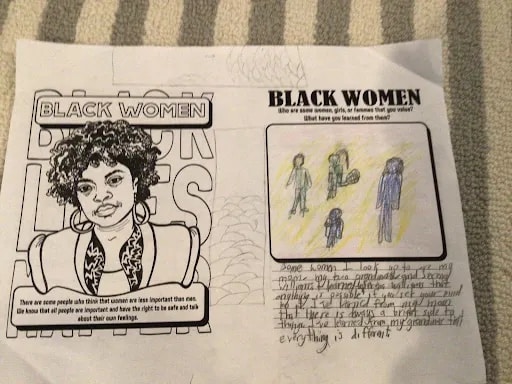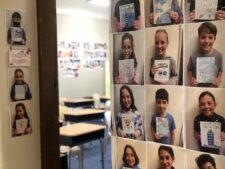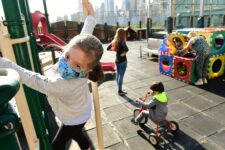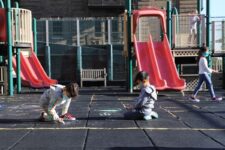For the past three months, a six-person team of faculty and administrators has been sharing dozens of resources with colleagues at Ethical Culture in connection with the nationwide Black Lives Matter at School coalition.
“Organizers with the Black Lives Matter at School movement recently released a set of resources via Padlet for this month’s Year of Purpose event that honors Barbara Johns, Black student activists, and the Black Lives Matter movement principles,” writes Vanessa D’Egidio, Ethical Culture Diversity, Equity, and Inclusion (DEI) Coordinator, in the most recent monthly update.
D’Egidio’s working group — which includes Geri Guidetti, Kindergarten Teacher; Adania Veras, Associate Teacher; Nelson Sanchez, Ethics Teacher; Devan Manning, Associate Teacher; and Yan Davydov, 3rd Grade Teacher — is one of 12 new professional development committees at Ethical Culture. Focused on anti-bias, anti-racist work, the committees exemplify the School’s commitment to ethical education as it doubles down on its mission of promoting equity, inclusion, and justice for all.
The Black Lives Matter at School coalition works to promote racial justice in Pre-K–12th Grade education. By developing curricula, sharing resources, and connecting educators across the country, the coalition aims to spark conversation and action among students of all ages in support of the broader Black Lives Matter movement.
The idea to incorporate Black Lives Matter at School in Ethical Culture’s curriculum was sparked by D’Egidio’s past experience before coming to ECFS. “As a teacher, I used the Black Lives Matter at School curriculum to teach into the movement for Black lives,” she explains. In winter 2020, D’Egidio sent a faculty-wide email to gauge interest in implementing the curriculum at Ethical Culture. Several teachers responded, and D’Egidio started an ad hoc group.
We also really wanted to leverage the momentum — the strengths and interests — of our faculty’s commitment to diversity, equity, inclusion, and justice work that they had carried from the spring.
For the 2020–2021 academic year, Black Lives Matter at School expanded beyond a single Week of Action to promote a new Year of Purpose — and D’Egidio saw an opportunity to connect the extended timeframe with the goal of sustaining the School’s commitment to DEI objectives all year long. Building on the experiences of the ad hoc group, D’Egidio introduced an alternative model of professional development: faculty-centered committees that would give teachers the freedom to pitch and choose topics of particular interest to examine over the course of a year. “I see value in collective organizing,” says D’Egidio. “We also really wanted to leverage the momentum — the strengths and interests — of our faculty’s commitment to diversity, equity, inclusion, and justice work that they had carried from the spring.” The Ethical Culture administrative leadership put a call out to faculty asking for proposals related to anti-bias, anti-racist work, and a variety of faculty members responded.
Of those committees, D’Egidio’s focuses on Black Lives Matter at School, but the range of other committees — spanning anti-bias literacy unit planning to recruiting and retaining families of color — reflects the many ways that anti-bias, anti-racist principles can be applied throughout the School. “We can think about curriculum when it comes to anti-bias work. We can think about family and community engagement. We can look at policies and protocols,” explains D’Egidio.
In February, the 4th Grade team at Ethical Culture — Liba Bronstein-Schwartz, Danny Crawford, and Sammy Seif — introduced their students to “What We Believe: A Black Lives Matter Principles Coloring Book”. Developed by author Laleña Garcia and illustrator Caryn Davidson as part of the Black Lives Matter at School movement, the book presents the 13 principles of the broader Black Lives Matter movement in developmentally appropriate language, art, and reflection questions that help students draw connections between their own lives and the values of justice and equity. Over multiple days, the 4th Grade classes worked through the pages of “What We Believe,” defining the principles, coloring in the illustrations, and writing thoughtful responses to the corresponding prompts. In a culminating assembly, all three classes gathered to share highlights of their work with their peers and to inspire one another.
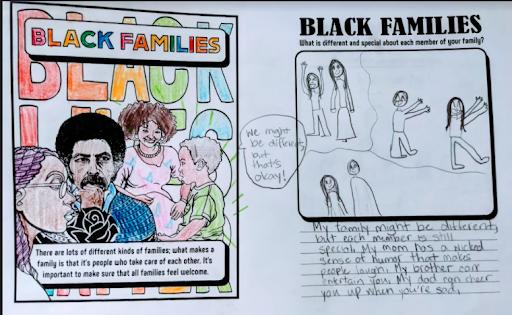
“’What We Believe’ provided an accessible entry point for the 4th Graders to discuss the Black Lives Matter principles in a way that they could connect with personally,” explains Seif, “as well as recognizing the connection between how those principles align with Ethical Culture’s mission of helping students become ethical and responsible members of society.”
Resources shared by their colleagues in the Black Lives Matter at School professional development committee allowed Bronstein-Schwartz, Crawford, and Seif to deepen their own understanding of issues related to the movement, even as they found their own ways to incorporate the movement into their classes. In their own professional development — Bronstein-Schwartz, Crawford, and Seif are all part of the Pollyanna Racial Literacy Curriculum committee, which was developed to help students in Pre-K–8th Grade gain a better understanding of race — they are also finding connections. “The Pollyanna Racial Literacy Curriculum helps me look at the development of racial literacy across grades and student ages, which then allows me to understand the foundations of what children can and should know before I bring in a book, lesson, or activity from the curriculum,” says Crawford.
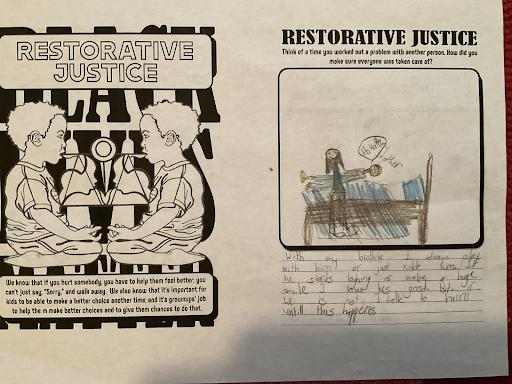
All three 4th Grade teachers appreciated the opportunity afforded by the professional development committee structure to collaborate with their colleagues. “Being in a small group really allows for richer discussion and more people to participate in general,” says Bronstein-Schwartz. “The new professional development structure has allowed us to learn from other grade levels and teachers in a year I find difficult to connect with others,” adds Crawford.
“I think the fact that the administration gave us the opportunity to suggest our own professional development recognizes the expertise that exists within our faculty,” says Bronstein-Schwartz. “This year, more than any other year, we want to find useful ways to develop professionally.”
As a way to ensure an ongoing commitment to self-education, and as a way to share the lessons learned with one another, each of the professional development committees set its own working goals. At the end of the academic year, the various committees — including Black Lives Matter at School and the Pollyanna Racial Literacy Program — will share out the progress they made toward reaching those goals.
A commitment to equity and justice is a continuous process, one that must far outlast the scope of a single academic year. At ECFS, that journey isn’t daunting; it’s inspiring.
“Tapping into the knowledge, strengths, and passions of our community members around this work and supporting one another in our continued growth is, I think, one of the great takeaways of these committees,” says D’Egidio. “This is just another great opportunity to do this work in a way that’s ongoing and that keeps pushing the work forward.”
